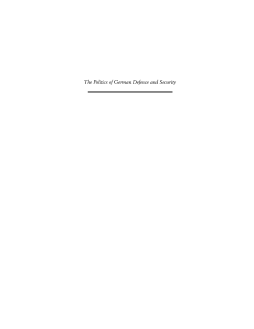
Additional Information
Book Details
Abstract
The post-Cold War era has witnessed a dramatic transformation in the German political consensus about the legitimacy of the use of force. However, in comparison with its EU and NATO partners, Germany has been reticent to transform its military to meet the challenges of the contemporary security environment. Until 2003 territorial defence rather than crisis-management remained the armed forces' core role and the Bundeswehr continues to retain conscription. The book argues that 'strategic culture' provides only a partial explanation of German military reform. It demonstrates how domestic material factors were of crucial importance in shaping the pace and outcome of reform, despite the impact of 'international structure' and adaptational pressures from the EU and NATO. The domestic politics of base closures, ramifications for social policy, financial restrictions consequent upon German unification and commitment to EMU's Stability and Growth Pact were critical in determining the outcome of reform. The study also draws out the important role of policy leaders in the political management of reform as entrepreneurs, brokers or veto players, shifting the focus in German leadership studies away from a preoccupation with the Chancellor to the role of ministerial and administrative leadership within the core executive. Finally, the book contributes to our understanding of the Europeanization of the German political system, arguing that policy leaders played a key role in 'uploading' and 'downloading' processes to and from the EU and that Defence Ministers used 'Atlanticization' and 'Europeanization' in the interests of their domestic political agendas.
Tom Dyson is a Lecturer at the University of Surrey, having previously worked as an ESRC Research Fellow at the International Relations Department, London School of Economics and as a Visiting Lecturer at the LSE's Department of Government. He has published articles on German foreign and security policy in European Security and the British Core Executive in the Second World War in Contemporary British History.
"Taking the focus away from ideological considerations Dyson manages to add to the discussion a refined analysis of the domestic political network which influences the outcome of foreign and security policy to a great extend. The relations between the different political subsystems explain policy outcome far better than any ideological approach will ever do." · German Politics
"Tom Dyson provides a well-researched overview of the German military in the post Cold War era...The analysis allows the reader not only to follow the evolution of German security and defense policy more broadly from after the Wende through the Schröder administration, but it also permits a rare look into internal party politics in this area. The book in this way interestingly crosses the domestic/foreign policy lines of most authors whose expertise is one or the other without the background to present the analysis undertaken in this exhaustive, to be recommended, book.” · German Politics & Society
